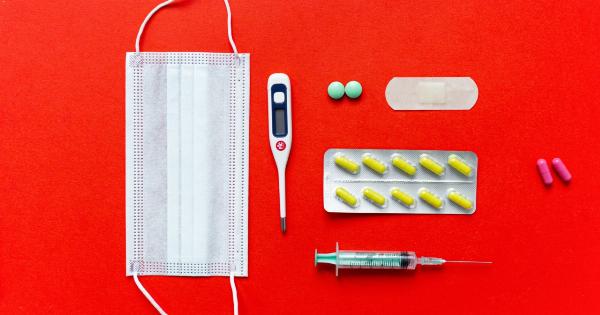Our immune system is responsible for protecting our bodies against harmful invaders such as bacteria, viruses, and toxins. It plays a crucial role in keeping us healthy and preventing illnesses.
While there are many factors that contribute to a strong immune system, including a healthy lifestyle and proper nutrition, certain vitamins are particularly important in supporting its function. In this article, we will discuss five essential vitamins that can help strengthen your immune system and keep you feeling your best.
Vitamin C
Vitamin C, also known as ascorbic acid, is a powerful antioxidant that plays a vital role in supporting the immune system. It helps stimulate the production of white blood cells, which are essential for fighting off infections.
Vitamin C also helps protect immune cells from damage caused by harmful free radicals.
One of the best sources of vitamin C is citrus fruits like oranges, lemons, and grapefruits. Other good sources include strawberries, kiwi, bell peppers, and broccoli.
Including these fruits and vegetables in your diet can provide a natural boost to your immune system.
Vitamin D
Vitamin D is often referred to as the “sunshine vitamin” because our bodies can produce it when our skin is exposed to sunlight. It plays a crucial role in regulating immune function and can help enhance the response of immune cells.
Vitamin D deficiency has been linked to a higher susceptibility to infections and autoimmune diseases.
Unfortunately, many people don’t get enough vitamin D from sunlight alone, especially during the winter months or if they spend most of their time indoors.
Foods such as fatty fish (salmon, mackerel), fortified dairy products, and egg yolks are good dietary sources of vitamin D. In some cases, supplementation may be necessary, particularly for individuals with limited sun exposure.
Vitamin E
Vitamin E is a potent antioxidant that helps protect immune cells from damage and supports their overall function.
It also plays a crucial role in the production of antibodies, which are proteins that help identify and neutralize harmful substances in the body.
Good sources of vitamin E include nuts and seeds, such as almonds, sunflower seeds, and hazelnuts. Leafy green vegetables, such as spinach and broccoli, are also rich in this important vitamin.
Adding these foods to your daily diet can help boost your immune system and provide other health benefits as well.
Vitamin A
Vitamin A is essential for maintaining the health of the mucosal surfaces in your body, such as your respiratory and gastrointestinal tracts.
These surfaces act as barriers against infections, preventing harmful bacteria and viruses from entering your body.
One of the best sources of vitamin A is brightly colored fruits and vegetables, like carrots, sweet potatoes, and apricots. Leafy green vegetables and dairy products also contain vitamin A.
Including a variety of these foods in your diet can help strengthen your immune system and protect your body from infections.
Zinc
While not a vitamin, zinc is a mineral that plays a vital role in immune function. It helps activate and enhance the activity of immune cells, such as white blood cells and T-cells.
Zinc deficiency is known to impair immune function and increase the risk of infections.
Good dietary sources of zinc include seafood (oysters, crab, lobster), lean meats, nuts, and seeds. Legumes, such as chickpeas and lentils, are also a good source of this mineral.
Including these foods in your diet can help ensure that your immune system has an adequate supply of zinc to function optimally.
Incorporating Immune-Boosting Vitamins into Your Diet
Now that you know about these essential vitamins and their benefits for your immune system, you may be wondering how to incorporate them into your diet. Here are some tips:.
1. Eat a Variety of Fruits and Vegetables
Include a wide range of fruits and vegetables in your daily meals to ensure you get a good mix of vitamins and minerals. Try to eat seasonal produce and opt for fresh or frozen options whenever possible.
2. Consider Supplementation
If you struggle to meet your body’s vitamin requirements through diet alone, you may consider taking supplements. Consult with a healthcare professional to determine the right dosage and the best supplement options for you.
3. Get Plenty of Sunlight
Expose your skin to sunlight regularly to promote the natural production of vitamin D. However, remember to protect your skin from harmful UV rays by wearing sunscreen or covering up after a short period of sun exposure.
4. Cook Your Vegetables Properly
Some vitamins are sensitive to heat and can be lost during cooking. To retain the maximum nutritional value, consider steaming or eating vegetables raw whenever possible.
5. Pair Vitamin C-Rich Foods with Iron-Rich Foods
Vitamin C enhances the absorption of iron from plant-based sources. To boost your iron levels, consume vitamin C-rich foods alongside iron-rich foods like legumes, tofu, and spinach.
6. Practice Good Hygiene
While vitamins are important for a strong immune system, practicing good hygiene also plays a crucial role in preventing infections. Wash your hands regularly, avoid touching your face, and follow other recommended hygiene practices.
Conclusion
Ensuring that your immune system is strong and resilient is essential for maintaining optimal health.
While these five vitamins – vitamin C, vitamin D, vitamin E, vitamin A, and zinc – are particularly important for immune function, it’s important to remember that having a well-balanced diet, regular exercise, and quality sleep are also crucial for supporting a robust immune system. By incorporating these immune-boosting vitamins into your diet and adopting a healthy lifestyle, you can strengthen your immune system and reduce the risk of illnesses.































